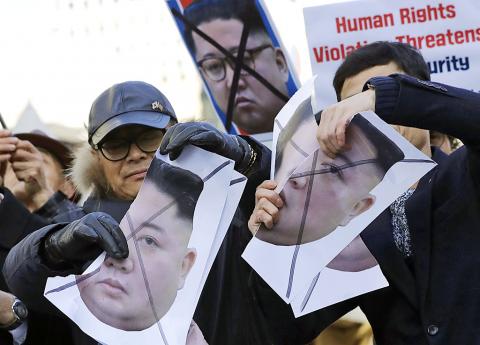About half of 451 North Korean defectors questioned in a survey endured physical violence at the hands of North Korean authorities, a rights group said yesterday, as North Korean leader Kim Jong-un prepared to meet US President Donald Trump for a summit.
On Sunday, US lawmakers called Kim the “leader of perhaps the world’s most repressive regime,” but analysts say that as in the leaders’ first summit, human rights are unlikely to be addressed in their second.
Trump and Kim are due to meet in the Vietnamese capital, Hanoi, today and tomorrow, eight months after their historic Singapore summit.

Photo: AP
On the top of their agenda is the denuclearization of the Korean Peninsula, and what concessions the US might offer in return for North Korea giving up its weapons.
North Korea’s poor human rights record is not likely to figure prominently, if at all.
The survey, conducted between 2015 and 2018 and released by Seoul-based Transitional Justice Working Group, found that three out of four North Korean defectors had, before they fled North Korea, experienced physical violence or the death of close family members, by execution or starvation, forced repatriation, arrest or detention.
About 48 percent of the respondents said that they had personally experienced violence perpetrated by the North Korean authorities, including beating, torture, rape and other sexual assault.
There has been dismay that rights seem to have been relegated down the agenda in dealing with North Korea.
In Seoul, protesters yesterday tore up photographs of Kim and threw them to the ground.
“We are skeptical of the US-North Korea summit without discussing human right issues,” said Ihn Ji-yeon, a leader of the anti-North rally and a spokeswoman for the Korean Patriots Party.
British Minister of State for the Commonwealth and United Nations Tariq Ahmad on Monday told the UN Human Rights Council in Geneva, Switzerland, that human rights in North Korea had not improved.
“Despite some welcome signs on the political track, there has been no improvement in the human rights situation,” he said.
“Meeting the challenge of North Korea’s nuclear weapons and missile programs, as well as addressing other issues such as North Korea’s systemic, gross violations of human rights, is of concern to all Americans and to our allies and partners,” US senators said in a letter to Trump on Sunday.
However, South Korean Minister of Foreign Affairs Kang Kyung-wha told the Geneva council that “human rights cannot thrive in the absence of peace.”
She said that progress toward a “nuclear-free Korean Peninsula,” which had started, would have enormous rewards, including an improvement in human rights.

Yemen’s separatist leader has vowed to keep working for an independent state in the country’s south, in his first social media post since he disappeared earlier this month after his group briefly seized swathes of territory. Aidarous al-Zubaidi’s United Arab Emirates (UAE)-backed Southern Transitional Council (STC) forces last month captured two Yemeni provinces in an offensive that was rolled back by Saudi strikes and Riyadh’s allied forces on the ground. Al-Zubaidi then disappeared after he failed to board a flight to Riyadh for talks earlier this month, with Saudi Arabia accusing him of fleeing to Abu Dhabi, while supporters insisted he was

‘SHOCK TACTIC’: The dismissal of Yang mirrors past cases such as Jang Song-thaek, Kim’s uncle, who was executed after being accused of plotting to overthrow his nephew North Korean leader Kim Jong-un has fired his vice premier, compared him to a goat and railed against “incompetent” officials, state media reported yesterday, in a rare and very public broadside against apparatchiks at the opening of a critical factory. Vice Premier Yang Sung-ho was sacked “on the spot,” the state-run Korean Central News Agency said, in a speech in which Kim attacked “irresponsible, rude and incompetent leading officials.” “Please, comrade vice premier, resign by yourself when you can do it on your own before it is too late,” Kim reportedly said. “He is ineligible for an important duty. Put simply, it was

‘TERRORIST ATTACK’: The convoy of Brigadier General Hamdi Shukri resulted in the ‘martyrdom of five of our armed forces,’ the Presidential Leadership Council said A blast targeting the convoy of a Saudi Arabian-backed armed group killed five in Yemen’s southern city of Aden and injured the commander of the government-allied unit, officials said on Wednesday. “The treacherous terrorist attack targeting the convoy of Brigadier General Hamdi Shukri, commander of the Second Giants Brigade, resulted in the martyrdom of five of our armed forces heroes and the injury of three others,” Yemen’s Saudi Arabia-backed Presidential Leadership Council said in a statement published by Yemeni news agency Saba. A security source told reporters that a car bomb on the side of the road in the Ja’awla area in

The Chinese Embassy in Manila yesterday said it has filed a diplomatic protest against a Philippine Coast Guard spokesman over a social media post that included cartoonish images of Chinese President Xi Jinping (習近平). Philippine Coast Guard spokesman Jay Tarriela and an embassy official had been trading barbs since last week over issues concerning the disputed South China Sea. The crucial waterway, which Beijing claims historic rights to despite an international ruling that its assertion has no legal basis, has been the site of repeated clashes between Chinese and Philippine vessels. Tarriela’s Facebook post on Wednesday included a photo of him giving a